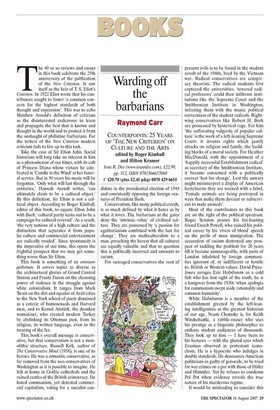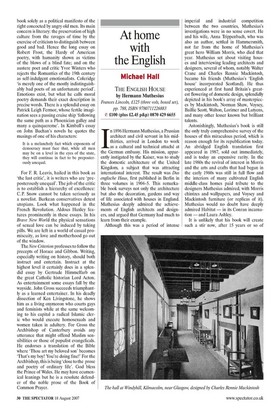Warding off the barbarians
Raymond Carr COUNTERPOINTS: 25 YEARS OF 'THE NEW CRITERION' ON CULTURE AND THE ARTS edited by Roger Kimball and Hilton Kramer Ivan R. Dee (wwwivanrdee.com), £22.99, pp. 512, ISBN 978156663 7060 © £20.70 (plus £2.45 p&p) 0870 429 6655 The 40 or so reviews and essays in this book celebrate the 25th anniversary of the publication of the New Criterion. It saw itself as the heir of T. S. Eliot's Criterion. In 1922 Eliot wrote that his contributors sought to foster 'a common concern for the highest standards of both thought and expression'. This was to echo Matthew Arnold's definition of criticism as the disinterested endeavour to learn and propagate the best that is known and thought in the world and to protect it from the onslaught of philistine barbarians. For the writers of the New Criterion modern criticism fails to live up to this task.
Take the case of Sir Elton John. Social historians will long take an interest in him as a phenomenon of our times, with its cult of Princess Diana whose virtues he celebrated in 'Candle in the Wind' at her funeral service. But in 50 years his music will be forgotten. 'Only what will last through the centuries,' Hannah Arendt writes, 'can ultimately claim to be a cultural object.' By this definition, Sir Elton is not a cultural object. According to Roger Kimball, editor of this book, to equate Elton John with Bach, 'cultural parity turns out to be a campaign for cultural reversal'. As a result, `the very notions of a high culture and the distinction that separates it from popular culture and commercial entertainment are radically eroded'. Since spontaneity is the imperative of our time, this opens the frightful prospect that we may get something worse than Sir Elton.
This book is something of an omnium gatherum. It covers topics as diverse as the architectural glories of Grand Central Station and Frantz Fanon on the cleansing power of violence in the struggle against white colonialism. It ranges from Mark Twain on the dirt and squalor of Arab cities to the New York school of poets dismissed as a coterie of homosexuals and Harvard men, and to Kemal Atatark, the drunken womaniser, who created modern Turkey by abolishing its Ottoman past, from its religion, its written language, even to the wearing of the fez.
This book's overall message is conservative, but that conservatism is not a monolithic structure. Russell Kirk, author of The Conservative Mind (1958), is one of its heroes. He was a romantic conservative, as far removed from the neo-conservatives of Washington as it is possible to imagine. He felt at home in Gothic cathedrals and the ruined castles of the British aristocracy. He hated communism, yet detested commercial capitalism, voting for a socialist candidate in the presidential election of 1944 and consistently opposing the foreign ventures of President Bush.
Conservatism, like many political creeds, is as much defined by what it hates as by what it loves. The barbarians at the gates deny the 'intrinsic value' of civilised culture. They are possessed by 'a passion for egalitarianism combined with the lust for change'. They are multiculturalists to a man, preaching the heresy that all cultures are equally valuable and that to question this is politically incorrect and amounts to racism.
For outraged conservatives the root of present evils is to be found in the student revolt of the 1960s, bred by the Vietnam war. Radical conservatives are conspiracy theorists. The radical students first captured the universities; 'tenured radical professors' could then infiltrate institutions like the Supreme Court and the Smithsonian Institute in Washington, infecting them with the manic political correctness of the student radicals. Rightwing conservatives like Robert H. Bork are possessed by hysterical rage. For him 'the suffocating vulgarity of popular culture' is the work of a left-leaning Supreme Court: it invents rights which justify attacks on religion and family, the building blocks of a moral society. For Heather MacDonald, with the appointment of a 'happily successful Establishment radical' as secretary of the Smithsonian Institute, it became consumed with a politically correct 'lust for change'. Lest the unwary might misinterpret a display of American hartebeests they are warned with a label, 'Female animals are being portrayed in ways that make them deviant or subservient to male animals'.
Most of the contributors to this book are on the right of the political spectrum. Roger Scruton praises his fox-hunting friend Enoch Powell, who ruined his political career by his 'rivers of blood' speech on the perils of mass immigration. The accusation of racism destroyed any prospect of tackling the problem for 20 years till it became unmanageable, with parts of London inhabited by foreign communities ignorant of, or indifferent or hostile to, British or Western values. David PryceJones savages Eric Hobsbawm as a cold fish who has lost sight of the truth; he is a hangover from the 1930s 'when apologia for communism swept aside rationality and common humanity'.
While Hobsbawm is a member of the establishment greeted by the left-leaning intelligentsia as the greatest historian of our age, Noam Chomsky is, for Keith Windschuttle, a rabble-rouser who uses his prestige as a linguistic philosopher to enthuse student audiences of thousands. They look up to him — I have been to his lectures — with the glazed eyes which Erasmus observed in protestant iconoclasts. He is a hypocrite who indulges in double standards. He denounces American politicians as guilty of genocide, to be tried for war crimes on a par with those of Hitler and Himmler Yet he refuses to condemn Pol Pot when evidence reveals the true nature of his murderous regime.
It would be misleading to consider this book solely as a political manifesto of the right concocted by angry old men. Its main concern is literary: the preservation of high culture from the ravages of time by the exercise of criticism to distinguish between good and bad. Hence the long essay on Robert Frost, the Hardy of American poetry, with humanity shown as victims of the blows of a blind fate; and on the austere poet and critic Yvor Winters who rejects the Romantics of the 19th century as self-indulgent emotionalists. Coleridge 'is merely one of the mostly indistinguishably bad poets of an unfortunate period'. Emotions exist, but what he calls moral poetry demands their exact description in precise words. There is a splendid essay on Patrick Leigh Fermor, whose fertile imagination sees a passing cruise ship 'following the same path as a Phoenician galley and many a quinquereme'. In Kimball's essay on John Buchan's novels he quotes the musings of one of his characters: It is a melancholy fact which exponents of democracy must face that, while all men may be on a level in the eyes of the state, they will continue in fact to be preposterously unequal.
For E R. Leavis, hailed in this book as 'the last critic', it is writers who are 'preposterously unequal'. The job of the critic is to establish a hierarchy of excellence: C. P. Snow cannot be taken seriously as a novelist. Burkean conservatives detest utopians. Look what happened in the French Revolution. Aldous Huxley features prominently in these essays. In his Brave New World the physical sensations of sexual love can be induced by taking pills. We are left in a world of casual promiscuity, as love and motherhood go out of the window.
The New Criterion professes to follow the precepts of Horace and Gibbon. Writing, especially writing on history, should both instruct and entertain. Instruct at the highest level it certainly does in a splendid essay by Gertrude Himmelfarb on the great Catholic historian Lord Acton. As entertainment some essays fall by the wayside. John Gross succeeds triumphantly as a learned entertainer. In his deadly dissection of Ken Livingstone, he shows him as a living oxymoron who courts gays and feminists while at the same welcoming to his capital a radical Islamic cleric who would execute homosexuals and women taken in adultery. For Gross the Archbishop of Canterbury avoids any utterance that might offend Muslim sensibilities or those of populist evangelicals. He endorses a translation of the Bible where 'Thou art my beloved son' becomes 'That's my boy! You're doing fine!' For the Archbishop, this is being 'close to the prose and poetry of ordinary life'. God bless the Prince of Wales. He may have ecumenical leanings but he is a resolute defender of the noble prose of the Book of Common Prayer.













































 Previous page
Previous page